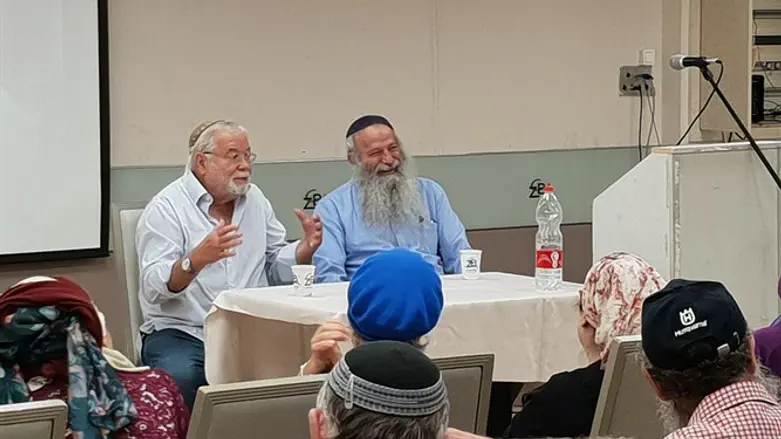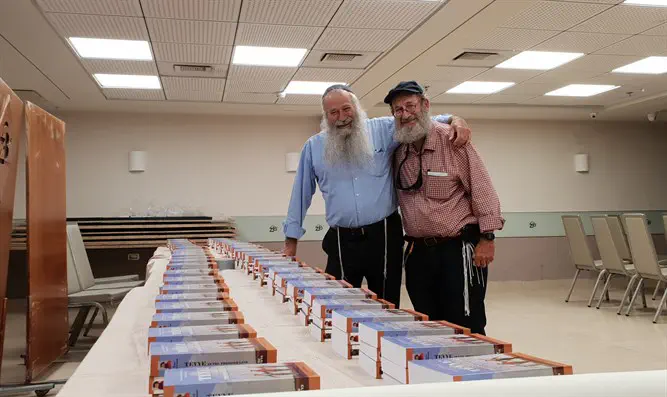
Two months after the devastating fire-arson that destroyed moshav Mevo Modiin, its 60 families are still housed in temporary quarters in the Zipori Hotel of Kibbutz Chofetz Chaim. Residents of the moshav lost not only their homes and possessions, but also their computers, photo albums, creative works in all fields of art, books, and pictures of their beloved Rebbe, Shlomo Carlebach, which once hung on the now char-covered walls.
Pitted against a government bureaucracy of four different government ministries, they have no idea what the future will bring and when they will be moved to new homes in their devastated forest village where hardly a tree remains.
This week, author and film director, Tzvi Fishman, organized an evening of solidarity for the group, giving each family his “Tevye in the Promised Land” trilogy to help fill the hours they spend in the lobby of the hotel, waiting for word that they can return to the scorched moshav. After screening his movie, “Stories of Rebbe Nachman,” Fishman introduced the popular Israeli actor, Yehuda Barkan, who spoke to the families, candidly describing how he overcame difficulties in the course of his own life, ensuring them that the tragedy would turn into rebirth and rebuilding, just like the rebirth of Am Yisrael in Eretz Yisrael today.

“These people lost everything but hope,” he told Arutz Sheva. “It is important for them to know that we haven’t forgotten them. People from all over the world have been very generous with donations, but a smile and warm handshake can sometimes do even more.”
“I think I organized the evening to pay back a debt to Rav Shlomo,” Fishman explained. “He saved me from drowning in the darkness of Hollywood when I first embarked on my journey of tshuva. Walking around LA with his songs blaring through my Walkman earphones, his music, whistling, and lyrics blasted away all of the fake movie-studio sets, all of the vain pursuit after money and fame, all of the addiction to material pleasures, connecting me with a spiritual world beyond the race for success.”
Fishman says he met the singing Rabbi only once, in Manhattan, at a Melave Malka at the Carlebach Shul on the Upper West Side. “Rabbi Carlebach was like the Tzaddik in Rebbe Nachman’s story, ‘The Turkey Prince,’ who climbs down under the table to communicate with the son of the king who believes he has turned into a turkey. Wherever there were Jews in the world who needed a lifeline of Yiddishkeit, Shlomo would find them and pull them back to their true Jewish selves with his songs and his gratuitous love.”
One of the residents of the moshav, Richard Millman, produced the successful move, “Lords of Flatbush,” back in the late Seventies. Currently, he is trying to promote his idea to produce a series about the moshav for Israel TV.
“It hasn’t been easy for us,” he confides. “Before the fire, there was a lot of in-fighting on the moshav. Many people stopped speaking to one another. All over the world, Carlebach minyans were flourishing while Shlomo’s shul on the moshav was half empty on Friday nights. Miraculously, the shul was one of the only buildings which survived the blaze, a symbol of the eternity of his Torah teachings. Hopefully the fire also destroyed the walls in our hearts that slowly developed after Shlomo went to Heaven."
"Suddenly, in the hotel here, we are all together, working as a team to set our lives back on the path that Shlomo taught everyone to follow, the love for each and every Jew, something especially important in these days before Tisha B’Av. G-d willing, the words of Yehuda Barkan will come true, and the destruction of the moshav will turn into a flowering rebirth and rebuilding, for us, and for all the Jewish People, as Shlomo always sang and prayed.”